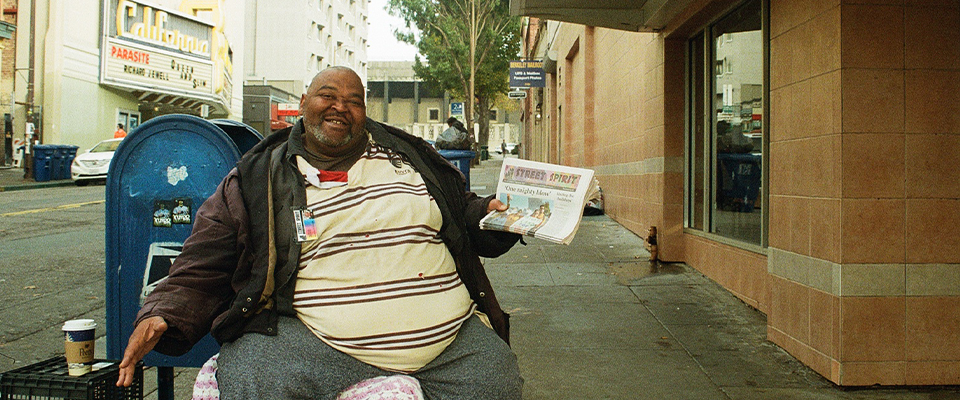Over the phone, Olantis Livingston’s gravelly voice is tinged with fear. In addition to a viral pandemic, the 46-year-old must confront a sudden loss of income. Livingston has sold Street Spirit, a Berkeley newspaper covering local homelessness issues, for 16 years. But on March 19, Spirit staff, led by UC Berkeley alumna Alastair Boone, decided to temporarily cease distribution of the newspaper’s print edition out of concern for the health of vendors like Livingston, leaving him and dozens of other sellers without the income they once relied on.
“It takes longer for news to trickle down into the homeless community,” Boone said. “I started to worry about vendors not getting the information.”
“It’s like a nightmare,” he said, adding that his only other source of income, a social security check, just covers his rent.
Street Spirit is part of a network of more than 120 newspapers covering homelessness, called the International Network of Street Papers (INSP), located in 35 countries and written in 25 languages. Ninety percent of these street papers have shut down their print editions and switched to online-only publication due to coronavirus concerns—something that has never happened in the network’s 26-year history, said Israel Bayer, director of the North American Bureau of the INSP.
Livingston uses his earnings from the newspaper to cover the co-pays for 15 medications he takes to treat lung and heart issues, he said. He recently ran out of blood pressure medication, and without the newspaper money, he can’t afford to refill the prescription. Since then, his breathing has gotten “really bad.”
“I’m really hurting now,” he said.
Most of the Street Spirit vendors are either unhoused or reliant on social welfare programs. In an attempt to help them stay on their feet during the shelter-in-place order, the newspaper has teamed up with its San Francisco sister publication, Street Sheet, in an attempt to fundraise enough donations to pay each of their vendors a small stipend.

Even before California Governor Gavin Newsom issued the statewide stay-at-home order March 19 in response to coronavirus concerns, Street Spirit editor-in-chief Alastair Boone said she began to worry whether the vendors would be able to earn enough from newspaper sales. Sidewalk traffic and public events had begun to dwindle amid increasingly strict social distancing guidelines, Boone said. Vendors rely on face-to-face interactions with pedestrians to sell their papers, and she wondered whether they would know to protect themselves from infection.
“It takes longer for news to trickle down into the homeless community,” Boone said. “I started to worry about vendors not getting the information.”
As it became clear that stay-at-home orders were imminent, she and members of the publication’s parent group, Youth Spirit Artworks, decided to shutter the print version of the newspaper for the remainder of March.
“I did not take that decision lightly,” Boone said, adding that this year, the paper’s 25th anniversary, should have been one of celebration. “It felt like, in a way, I was taking something away from people rather than continuing to support them. But ultimately it seemed like the more responsible decision.”
The person-to-person contact required to sell the newspapers by hand made it impossible for vendors to follow social distancing guidelines, and due to supply shortages, Spirit staff could not provide enough masks, gloves, or hand sanitizer to their sellers, many of whom “are older or have health concerns,” she said.
“They really don’t want to get sick,” Boone said. “People are really scared.”
About 80 to 100 people sell copies of Street Spirit each year. But staff at the newspaper have had difficulty contacting the vendors, Boone said. Many vendors rely on charging their phones at libraries and restaurants that have since closed to the public. And some don’t have phones at all.

As of March 10, the newspaper’s staff had only been able to reach about 15 of their vendors to warn them of the shutdown, but Boone didn’t need to talk to them to know that many would struggle without their income from the paper. While some vendors will be able to lean on social welfare programs to get through the shutdown, others rely on the extra cash from selling papers to buy survival gear like tents and sleeping bags or to pay their rent or phone bill, she said.
“That’s a group that I’m worrying about,” Boone said. “Those are some of the most vulnerable people who we serve.”
She reached out to staff at San Francisco’s Street Sheet to ask how they had been affected. The Sheet sees 200 to 300 vendors each year, and while Sheet editor and Berkeley alum Quiver Watts hasn’t told vendors to stop distributing the paper, most have stopped showing up to collect issues as foot traffic slows to a trickle. Many of the remaining vendors will lose their vending income beginning April 1, when the paper halts its print edition for similar health concerns, Watts wrote in an email.
Boone and Watts decided to launch a vendor support fund to help cushion the loss felt by sellers, with the goal of raising $40,000, enough to pay $100 each to the roughly 400 vendors that distribute both newspapers. As of March 30, the two newspapers had raised more than $19,000 via online fundraising platform GoFundMe, including several $1,000 donations from anonymous donors.
JC Orton said the social rewards of selling newspapers is “every bit as important” to the vendors as the money. “They’re not just clients. They’re friends.”
“We’re having some pretty good luck so far,” Boone said. “But I think if we’re going to reach our goal of $40,000, we have to approach a foundation or find an individual that is going to be very generous and contribute a larger sum.”
Staff at both newspapers are still debating whether to distribute the donations among vendors in the form of grocery store gift cards or cash, she said.
Boone originally planned to organize a coronavirus safety training and collect enough masks and gloves to give to the vendors in time for the next edition of the paper, which was scheduled to print April 7.
“Those items are in such short supply,” she said. “It didn’t seem ethical that we would stockpile masks while hospitals struggled to get these things.”
By March 26, an extension of the shelter-in-place order seemed inevitable, and nearly every other street paper in North America had decided to shut down their print production. Boone and the Spirit staff made the difficult decision to cancel the April edition.
“I’m devastated not to be printing,” she said. “It has always gone to print for 25 years.”
Until the shutdown, JC Orton, an employee who oversees distribution of the newspaper, was delivering new issues to one of several drop-off points around Berkeley. He sold issues to vendors out of his van for five cents each, which they in turn sold to passersby for a suggested two-dollar donation, though many customers gave more. The amount vendors made was variable, but they kept every cent of the profits. To see them lose their income felt like a “sucker-punch,” Orton said.“People tell me they use this money to get their rent paid. Some people have this, and nothing else.”

But the loss is not just to vendors’ pockets. Orton said the social rewards of selling newspapers is “every bit as important” to the vendors as the money. “They’re not just clients,” he said. “They’re friends.”
For his part, Livingston said that the relationships he built with his customers strengthened his resolve to stop selling drugs and to get off the streets. He used profits from paper sales to help pay for his father’s funeral, and repeat customers helped him work through the grief of his mother’s death. Livingston, who lives alone, described selling Street Spirit as “an act of freedom and therapy,” a chance to make a connection with others
“It kept me going. It was my stride,” Livingston said. “It’s been killing me sitting here in the house. I’m scared to death of people right now; I’m scared of catching it.”
Selling the newspaper gave a sense of purpose to many vendors and shutting it down has felt “counterintuitive,” Boone said. “In many ways, Street Spirit feels like a service provider. When things get really scary and unknown, the last thing you want to do is stop providing.”
Brian Howey is a freelance journalist based in Oakland, California. Send him story tips at BrianwHowey@protonmail.com and follow him on Twitter: @steelandballast.




















